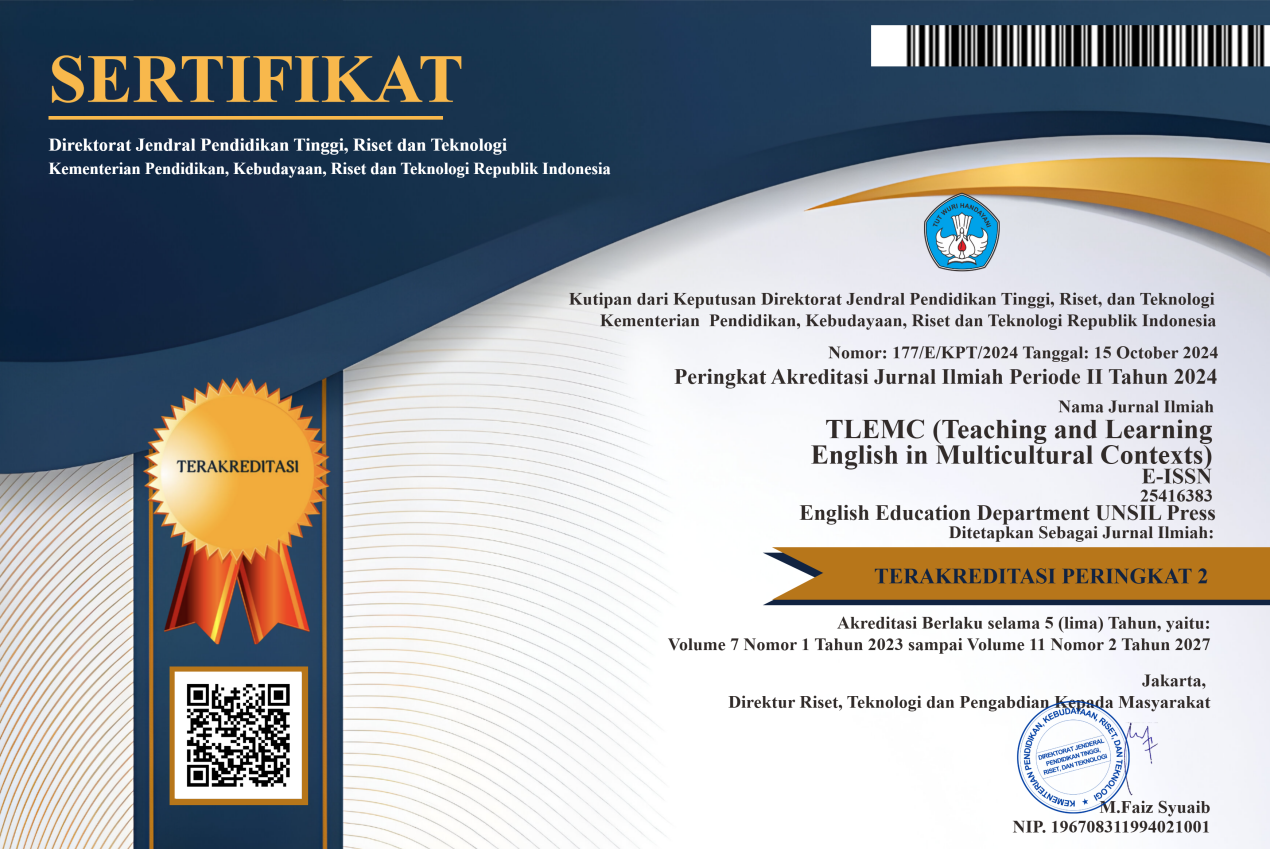"MY FEELINGS": UNDERGRADUATE STUDENTS' EMOTIONAL RESPONSES TOWARDS SUPERVISORS' WRITTEN CORRECTIVE FEEDBACK IN THEIR THESIS WRITING
Abstract
Full Text:
PDFReferences
Abiddin, N. Z., Hassan, A., & Ahmad, A. R. (2009). Research Student Supervision: An Approach to Good Supervisory Practice. The Open Education Journal, 2, 11-16.
Amrhein, H. R., & Nassaji, H. (2010). Written Corrective Feedback: What Do Students and Teacher Prefer and Why? Canadian Journal of Applied Linguistics, 13, 95-127.
Bitchener, J., & Basturkmen, H., (2010). The Focus of Supervisor Written Feedback to Thesis/Dissertation Students. International Journal of English Studies.
Braun V., & Clarke, V. (2006). Using Thematic Analysis in Psychology. Qualitative Research in Psychology, 3 (2), 16-23. Retrieved from http://dx.doi.org/10.1191/1478088706qp063oa
Chen, S., Nassaji, H., & Liu, Q. (2016). EFL learners’ perceptions and preferences of written corrective feedback: a case study of university students from Mainland China. Asian-Pacific Journal of Second and Foreign Language, 1(5), 1-17. http://dx.doi.org/10.1186/s40862-016-0010-y
Ferris, D. R. (2014). Responding to student writing: Teachers’ philosophies and practices. Assessing Writing, 19, 6–23.
Ferris, D. R., Liu, H., Sinha, A., & Senna, M. (2013). Written corrective feedback for individual L2 writers. Journal of Second Language Writing, 22, 307–329. http://dx.doi.org/10.1016/j.jslw.2012.09.009.
Harris, L. R., Brown, G. T., & Harnett, J. A. (2014). Understanding classroom feedback practices: A study of New Zealand student experiences, perceptions, and emotional responses. Educational Assessment, Evaluation and Accountability, 26, 107–133. http://dx.doi.org/10.1007/s11092-013-9187-5
Hess, U., & Thibault, P. (2009). Darwin and Emotion Expression. American Psychological, 64(2), 120–128. http://dx.doi.org/10.1037/a0013386
Hyland, K. (2013). Faculty feedback: Perceptions and practices in L2 disciplinary writing. Journal of Second Language Writing, 22, 240–253. http://dx.doi.org/10.1016/j.jslw.2013.03.003
Hodza, F. (2007). Managing the student-supervisor relationship for successful postgraduate supervision: A sociological perspective. South African Journal of Higher Education, 21 (8), 1155-1165.
Kahraman, A. & Yalvac, F. (2015). EFL Turkish university students’ preferences about teacher feedback and its importance. Social and Behaviour Science, 199, 73-80. http://dx.doi.org/ 10.1016/j.sbspro.2015.07.489
Kamberi, L. (2012). The significance of teacher feedback in EFL writing for tertiary level foreign language learners. Social and Behavioral Sciences, 70, 1686-1690. http://dx.doi.org/10.1016/j.sbspro.2013.01.241
Kleijn, R. A. M., Meijer, P. C., Pilot, A., & Mieke. (2013). The relation between feedback perceptions and the supervisor–student relationship in master’s thesis projects. Teaching in Higher Education, 19, 336–349. http://dx.doi.org/10.1080/13562517.2013.860109
Kormos, J. (2012). The role of individual differences in L2 writing. Journal of Second Language Writing, 21, 390–403. http://dx.doi.org/10.1016/j.jslw.2012.09.003.
Lee, I. (2008). Understanding teachers’ written feedback practices in Hong Kong secondary classrooms. Journal of Second Language Writing, 17, 69–85. http://dx.doi.org/10.1016/j.jslw.2007.10.001
Mack, L. (2009). Issues and Dilemmas: What conditions are necessary for effective teacher written feedback for ESL Learners? Polyglossia, 16, 33-39.
Mahfoodh, O. H. A., & Pandian, A. (2011). A qualitative case study of EFL students’ affective reactions to and perceptions of their teachers’ written feedback. English Language Teaching, 4(3), 14–25. http://dx.doi.org/10.5539/elt.v4n3p14
Mahfoodh, O. H. A. (2017). “I feel disappointedâ€: EFL university students’ emotional responses towards teacher written feedback. Assessing Writing, 31, 53-72. http://dx.doi.org/10.1016/j.asw.2016.07.001
McIntosh, M., J., and Morse, J., M. (2015). Situating and Constructing Diversity in Semi-Structured Interviews. SAGE, 1(12), 2. doi: 10.1177/2333393615597674
Peterson, E. R., & Irving, S. E. (2008). Secondary School Students' Conceptions of Assessment and Feedback. Learning and Instruction, 18 (3), 238-250. http://dx.doi.org/10.1016/j.learninstruc.2007.05.001
Plotnik, R., & Kouyoumdjian, H. (2013). Introduction to psychology. Independence. KY: Cengage Learning.
Robinson, S., Pope, D., & Holyoak, L. (2013). Can we meet their expectations? Experiences and perceptions of feedback in first year undergraduate students. Assessment & Evaluation in Higher Education, 38(3), 260–272. http://dx.doi.org/10.1080/02602938.2011.629291
Sadeghi, K. & Khajepasha, A., S. (2015). Thesis Writing Challenges For Non-native MA Students. Research in Post-Compulsory Education, 20(3), 357-373. http://dx.doi.org/10.1080/13596748.2015.1063808
Srichanyachon, N. (2012). Teacher Written Feedback for L2 Learners’ Writing Development. Journal of Social Sciences, Humanities, and Arts, 12 (1) : 7-17.
Yin R. K. (2003). Case study research: Design and methods. California: Sage Publications, Inc.
DOI: https://doi.org/10.37058/tlemc.v3i1.1125
Refbacks
- There are currently no refbacks.
INDEXED BY:
This work is licensed under a Creative Commons Attribution-NonCommercial-ShareAlike 4.0 International License.
![]()
TLEMC (Teaching and Learning English in Multicultural Contexts)
Program Studi Pendidikan Bahasa Inggris
Fakultas Keguruan dan Ilmu Pendidikan
Universitas Siliwangi
Jl. Siliwangi No. 24 Kota Tasikmalaya - 46115
email: tlemc@unsil.ac.id





